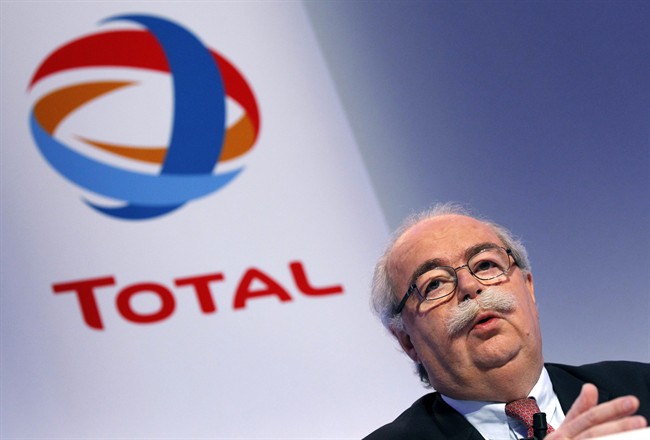MOSCOW – Christophe de Margerie, the charismatic CEO of Total SA who dedicated his career to the multinational oil company, was killed at a Moscow airport when his private jet collided with a snowplow whose driver was drunk, Russian investigators said Tuesday.

Three French crew members also died when the French-made Dassault Falcon 50 burst into flames after it hit the snowplow during takeoff from Vnukovo airport at 11:57 p.m. Monday local time.
“At the current time, it has been established that the driver of the snowplow was in a state of alcoholic intoxication,” Tatyana Morozova, an official with the Investigative Committee, Russia’s main investigative agency.
However, the snowplow’s driver denies he was drunk, according to his lawyer.
As well as questioning the driver of the snowplow, the Investigative Committee’s spokesman Vladimir Markin said the role of air traffic controllers in the incident is being assessed.
Video from the scene showed the charred plane lying on a grassy field. Though it had snowed earlier Monday in Moscow, it was unclear how much snow remained at the airport at the time of the crash.
Vnukovo is the airport used by Russian government officials, including President Vladimir Putin, and visiting foreign leaders. It also handles commercial flights from a separate terminal.
- Gas prices surge in some parts of Canada. What’s causing pain at the pumps?
- Buzz kill? Gen Z less interested in coffee than older Canadians, survey shows
- Ontario premier calls cost of gas ‘absolutely disgusting,’ raises price-gouging concerns
- Netflix beats subscriber targets, but revenue falls short of forecast
De Margerie, 63, was a regular fixture at international economic gatherings and one of the French business community’s most outspoken and recognizable figures. His trademark silver handlebar earned him the nickname “Big Mustache.”
A critic of sanctions against Russia, he argued that isolating Russia was bad for the global economy. He travelled regularly to Russia and recently dined in Paris with a Putin ally who is facing EU sanctions over Russia’s involvement in the crisis in Ukraine.
According to the Kremlin, Putin sent a telegram to his French counterpart Francois Hollande, lauding de Margerie for being at the “origins of the many major joint projects that have laid the basis for the fruitful co-operation between Russia and France in the energy sphere for many years.”
Hollande expressed his “stupor and sadness” at the news. In a statement, he praised de Margerie for defending French industry on the global stage, and for his “independent character and original personality.”
De Margerie started working for Total in 1974 after receiving his degree because it was close to home. It was a difficult time to join the firm as the OPEC oil embargo, which led to a fourfold increase in prices, was coming to an end.
“I was told ‘You have made the absolute worst choice. Total will disappear in a few months,'” he said in a 2007 interview with Le Monde newspaper.
De Margerie rose through the ranks, serving in several positions in the finance department and the exploration and production division before becoming president of Total’s Middle East operations in 1995. He became a member of Total’s policy-making executive committee in 1999, CEO in 2007, before adding the post of chairman in 2010.
He was a central figure in Total’s role in the United Nations oil-for-food program in Iraq, which was launched in the mid-1990s to alleviate the pressure on the country’s people in the wake of the sanctions imposed after the invasion of Kuwait in 1990. The program allowed Iraq to sell some oil in world markets in return for much-needed humanitarian needs but came under fire for widespread abuses through to the U.S.-led invasion of Iraq in 2003.
Total, among others, was accused of breaching the terms of the program. Last year, the company and De Margerie were acquitted in France of corruption charges related to the program.
Under his leadership, Paris-based Total claims it became the fifth-largest publicly traded integrated international oil and gas company in the world, with exploration and production operations in more than 50 countries.
“In a big company like Total, where you have 100,000 employees worldwide, we are based in 130 offices, yet Christophe de Margerie managed to make a connection with all of us,” said Khaled Yousuf, who works as a manager for affiliate relations at the Paris headquarters.
On Monday, de Margerie took part in a meeting of Russia’s Foreign Investment Advisory Council with members of the Russian government and other international business executives.
Jean-Jacques Guilbaud, Total’s secretary general, said the group would continue on its current path and that the board would meet in coming days to discuss who will succeed de Margerie. Total planned a minute of silence in its offices worldwide.
Names being touted as possible successors include Philippe Boisseau, the head of Total’s new energy division, Patrick Pouyanne, who leads the refining sector and Arnaud Breuillac, head of exploration and production.
After dipping slightly early Tuesday, Total’s share price closed 3.5 per cent higher, even more than the 2.3 per cent rise in the main Paris stock index.
___
Hinnant contributed from Paris. Milos Krivokapic in Paris, Iuliia Subbotovska in Moscow and Angela Charlton in London contributed to this report.



Comments